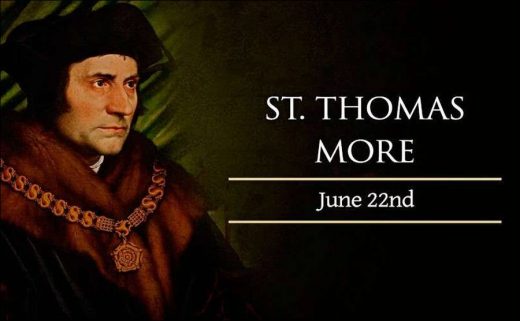Thomas More was an intellectual who believed in human abilities and the capacity to create himself, but thought that this should be realized in the social structure.
2016 is the 500th edition of Thomas More’s Utopia (1516), and this anniversary has been instrumental in celebrations and symposiums in England, where More was born and lived. More is known for painting an ideal world in his work Utopia, which is generally believed to express a radical political view. However, the problematic point of the views and publications made in this direction is that they mostly deal with the Utopia work and Thomas More’s stance from the perspective of the history of ideas.
What is meant here by the history of ideas is that historians of ideas are not very concerned with the historical context, that is, they study the development of ideas independently of the social, political, cultural and religious contexts surrounding historical events. In fact, the study of the history of ideas is a legitimate field in its own right and up to a point there is no problem, this approach can be considered a methodological difference.
However, the history of thought brings a holistic perspective, especially if you are studying the New Age. The way to take a holistic perspective is to consider the subject within the framework of historical contexts (political, economic, religious, cultural). Context is a tool that enables the historian to set his feet firmly on the period in which he works, and in this article, Thomas More’s Utopia will be discussed within the framework of these contexts and evaluated in terms of its dystopian tendencies.
Thomas More was a Renaissance humanist, and one of the contexts in which his work should be evaluated is More’s humanist perspective. Like almost every Renaissance humanist, ‘civic humanism’, i.e. ‘public humanism’, has been one of the elements he believed in. At the same time, he is a politician who has directed his career to take an active role in the public. He served as adviser to Henry and Lord Chancellor (President of the House of Lords).
Utopia can also be evaluated as a political philosophy text. The arguments that it is a utopian work were generally within this framework, and there was a consensus that the belief that the administration of the island of Utopia, as an ideal form of government, was the best form of government, pushed More to write this work. According to the utopia work, there was no private property on the island.
This situation is interpreted by historians with Utopian inclination as a political and moral choice of More. However, the element to be considered here is More’s use of metaphor and his intention in doing so. It can be accepted that he criticized the Kingdom of England and its administration by using the ideals of the island of Utopia, but More does not draw the slightest path and does not give an opinion on the realization of Utopia ideals. In this case, too, Utopia does not go beyond an impossible idealization.
An island of Utopia, which he thought would not be realized, is also a candidate to be in the category of being a social critic. What I mean by this is that Thomas More spent his life trying to find a place for himself in the existing order by doing public service, and in this work he tries to draw attention to the impossibility of utopian ideals.
This idea of impossibility is a dystopian trend: when Raphael finishes his story; I thought a lot about the war systems, religions, ceremonies, laws, customs and many other institutions of the Utopians. Most of these seemed unlikely to me. What really surprised me was the free symbiosis of this strange state.
This partnership, together with the money, is considered the honor of the state; it was uprooting all the bright and glorious superiorities such as nobility and greatness. Because Thomas More, as a Renaissance humanist, was an intellectual who believed in human abilities and the capacity to create himself, but thought that this should be realized in the social structure. As a political philosophy text, his answer to the question of how the best form of government should be seems to have been more realistic than idealistic.
Another context in which Thomas More’s Utopia should be evaluated is the religious debates at the time of its publication. More was greatly influenced by Erasmus’s humanist ideas and even made the first edition of Utopia by Erasmus himself. Erasmus is known by intellectual historians working in this period for his ideas that criticize the Church and lead to the Reformation. Erasmus’s Humanism should not be understood in a secular sense, for he believed that the church, not religion, should be reformed. In this sense, it is not surprising that Thomas More did not convert to Protestantism despite Henry 8, as was suspected by historians, but remained in the Catholic sect.
If we look at the perception of religion in his utopia, More clearly advocates a monotheistic religion, despite the diversity of his beliefs on the island. One of the important elements to note about the history of the Reformation is this: Humanists such as Erasmus advocated a reform of the Catholic Church in the first place, the movement gave birth to another sect of Protest, with the political support given to Martin Luther under the leadership of the German Principalities.
Erasmus had a great disagreement with Luther about whether man could change his own salvation and destiny with his own mind and efforts, and as a result, he moved away from the reformation together with other humanism representatives who argued that man’s own liberation could be architecture. Thomas More can be called Erasmusist in this sense, and it is known that he resisted the reformation program of Henry VIII precisely for this reason.
The separation of the English Kingdom and Henry the 8th from the Roman Church is based on an equally political reason. Henry used the ideals of the reformation to consolidate the idea of the Nation-Kingdom and to spread his authority. The most obvious example of this is that he put himself at the head of the National Church. With this step, he took Thomas More against him and soon cost him his life.
Views: 658




